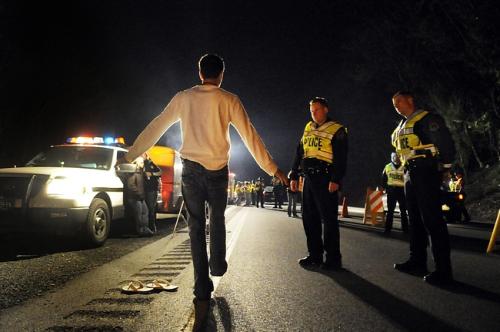Can Police Stop A Suspected DUI Driver In Pennsylvania?
Section 6308(b) of the Vehicle Code (Title 75) permits a police officer to stop a vehicle based upon “reasonable suspicion” that the driver is under the influence of alcohol or drugs. Normally a police officer needs “probable cause” for a traffic stop but the Pennsylvania Supreme Court has stated that Driving under the Influence (DUI) is different. Unlike a normal traffic violation, when a police officer sees what appears to be unsafe driving, there is a legitimate public safety issue. The law therefore permits the police officer to stop the car based on the lower evidentiary standard of reasonable suspicion. The reasoning is basically that to determine if a driver is committing a DUI, further investigation is required.
 The need for reasonable suspicion is in our Fourth Amendment to the United States Constitution and Article I, Section 8 of the Pennsylvania Constitution. Both of these documents and the countless number of judicial decisions that have followed protect us against unreasonable searches and seizures by law enforcement officers.
The need for reasonable suspicion is in our Fourth Amendment to the United States Constitution and Article I, Section 8 of the Pennsylvania Constitution. Both of these documents and the countless number of judicial decisions that have followed protect us against unreasonable searches and seizures by law enforcement officers.
While reasonable suspicion requires less “articulable facts” than probable cause, it still must be based on the officer’s observations. Reasonable suspicion needs to be more than a “hunch” or “shot in the dark.” When it comes to DUI, It’s important to understand that a police officer doesn’t have to actually see a traffic violation to stop a vehicle but only needs suspicion that the driver is intoxicated or impaired. It’s also important to keep in mind that courts will review the officer’s basis for reasonable suspicion from the standpoint of an objectively reasonable police officer and not a reasonable person. As you can image a police officer and a civilian have much different life experiences so when you think about this concept you need to keep that in mind.
Despite the very low evidentiary threshold that police need to overcome to stop a DUI suspect, many use a “pre-text” to stop a vehicle when they believe that the basis for the stop will be later questioned in court. We usually see pre-textual stops where the officer doesn’t observe some type of erratic driving or a clear moving violation. Pre-Textual stops usually take the form of bad tail lights, excessive tints, or cracked windshield, or expired inspection stickers. If you look hard enough on the average car it’s fairly easily to find something wrong with it.
Once the officer stops the car this is considered a “seizure” under the Pennsylvania and United State Constitution. At this point the driver maintains the right not to let the police officer search the car and I highly recommend that you NEVER consent to a search. While the police normally need either your consent or a warrant to search your car, the law, wants to protect them from violent criminals. Police are therefore permitted order a driver and the occupants from the vehicle for their safety; the officer doesn’t need any more than “fear for their own safety” as a basis. After a person is removed, however, the officer needs reasonable suspicion, independent from the original basis for stopping vehicle to continue an investigation of either the vehicle or the person. An independent basis may include a person’s movement, responses to questions, bulges in clothing, or even the smell of alcohol or drugs.
Once this basis is establish, which really doesn’t require much, the officer is allowed perform a “pat down” search of the suspect. This protective search is commonly known as “Terry Stop.” In addition to this safety exception the “Plain View” doctrine also permits the officer to gain access to a vehicle when he would otherwise need consent from the driver or a warrant. The “Plain View” doctrine permits the police to seize an item even if it’s within a car where the item is visible and clearly contraband (i.e. gun, drugs, paraphernalia.) Plain View and the officer’s safety are important exception because all vehicle searches conducted without a warrant or consent were presumed UNREASONABLE and therefore ILLEGAL in Pennsylvania
A recent Pennsylvania Supreme Court Case, however, now permits an officer to conduct a warrantless search of a vehicle based on the totalities of the circumstances surrounding the stop and the information obtained during the officer’s investigation. A very important constitutional principal is that no state may provide less constitutional protections then what is contained in the United States Constitution but there is no prohibition against a higher level of protection. Historically, Pennsylvania was one of those states that provided a higher level of protection. The Gary decision, however, somewhat changed that precedent in fact the Pennsylvania Supreme Court in Gary very specifically stated that the search and seizure provision of the Pennsylvania Constitution provides no greater protection than the Fourth Amendment. While Gary did not involve a DUI, it’s still nevertheless an important decision for all cases involve police traffic stops. Gary involved a traffic stop in which the police officer ordered the suspect out of the vehicle when he admitted he had “weed” in the car. When a drug-sniffing dog arrived, the suspect attempted to run from the officer and was apprehended. The officer than searched the car and discovered drugs—2 pounds of marijuana under the front hood!
In finding this search constitutional, the court explained its reasoning by finding that Pennsylvania’s Constitution employed the same two-part test utilized under the U.S. Constitution. That test asks, (1) Does the individual maintain a subjective expectation of privacy in the area searched? (2) Does society recognize that expectation as reasonable and legitimate?
Prior to this decision, Pennsylvania allowed warrantless searches only if law enforcement could establish probable cause and “exigent” circumstances, which usually meant the possibility that the evidence could quickly be destroyed (flushed down a toilet, for instance) or some other circumstance beyond the control of police. Unlike federal courts, Pennsylvania courts, until Gary, did not consider the automobile itself an exigent circumstance. In Gary, the Pennsylvania Supreme Court reasoned that an automobile is inherently mobile and therefore no search warrant is required as long as there is probable cause to initiate the search.
While there is no question that a vehicle is mobile, it’s clear that the court’s reasoning is open to criticism and years of challenges. In virtually every vehicle stop, the driver and the occupants are required to get out of the vehicle before any search, so the car is immobilized. In addition, there is no prohibition against law enforcement detaining suspects for a short time to obtain a search warrant issued by an independent judicial officer (a judge).
The Gary decision presents defense attorney with problem especially in DUI cases. Allowing the officer to search a vehicle extends a police investigation and thus allows them more time to evaluate a suspect’s movement, speech and overall demeanor. A police stop premised on the driver’s intoxication focuses the officers on the driver’s movement—even if that movement is simply the driver answering questions or standing next to the car.
The Gary case also provides police with another opportunity to find more evidence to support a DUI charge (i.e. open containers) or evidence of other crimes (i.e. drugs, guns). Despite Gary, there is still plenty of room to argue that this troublesome decision doesn’t apply to your specific case. If a court makes such a finding then it is not obligated to follow the decision.
Contact Our Criminal Defense Lawyers in PA & NJ
Please click here to contact our Philadelphia criminal defense lawyers. We offer free case reviews and serve the following areas in Pennsylvania and New Jersey, Atlantic City, Camden, Cherry Hill, Chester, Conshohocken, Doylestown, Media, Norristown, Philadelphi



